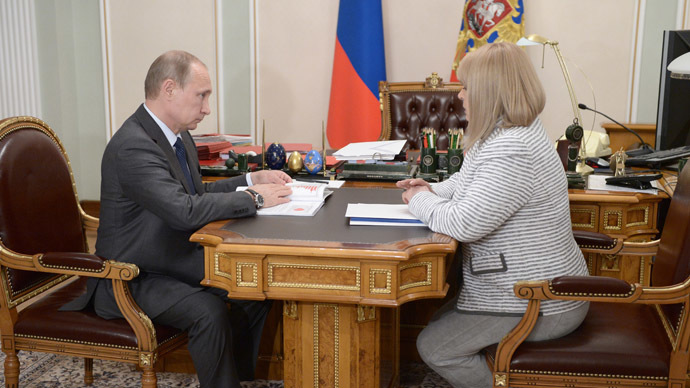Most Russian see improvement in rights, but more restrictive bills – ombudsman

Nearly half of all Russians say that the situation with human rights in the country is improving, but lawmakers have proposed more bans and restrictions over the past year, the presidential human rights envoy says in her report.
According to the latest research, 45 percent of Russians think that the human rights situation has improved over the last year. Thirty-three percent saw no changes and only 14 percent answered that they felt a deterioration in the rights sphere, says the document published on the presidential envoy’s website Wednesday.
The ombudsman, Ella Pamfilova, personally presented the annual report to President Vladimir Putin on the same day.
In the same research, she expressed concern over the growing number of restrictive bills drafted by Russian parliamentarians in 2014. “The ombudsman suggests that lawmakers stop their attempts to solve complicated problems through simple restrictive measures and bans that could never solve any problems but just drove them deeper under the surface,” Pamfilova’s comments read.
In all, the rights envoy’s office received over 60,000 complaints from citizens in 2014 - 44 percent more than in the previous year, Pamfilova said at the meeting with the president. Most complaints concerned the right to work, personal security and education as well as environmental issues and quality of water and food. “The complaints mainly come from socially unprotected groups and can cover all spheres, including culture, family or business,” the envoy added.
READ MORE: Rights situation in Russia improved, but problems remain - ombudsman
Pamfilova also stated that the number of complaints filed by Russian citizens from abroad has grown by 30 percent, but said that Russian officials learned to solve such problems more effectively – the number of cases where violated rights were restored increased 2 ½times.
The Russian parliament approved Pamfilova as presidential envoy for human rights in March 2014 after her candidacy had been suggested by President Vladimir Putin. Before this appointment, Pamfilova chaired the Presidential Council for Development of Civil Society and Human Rights.












